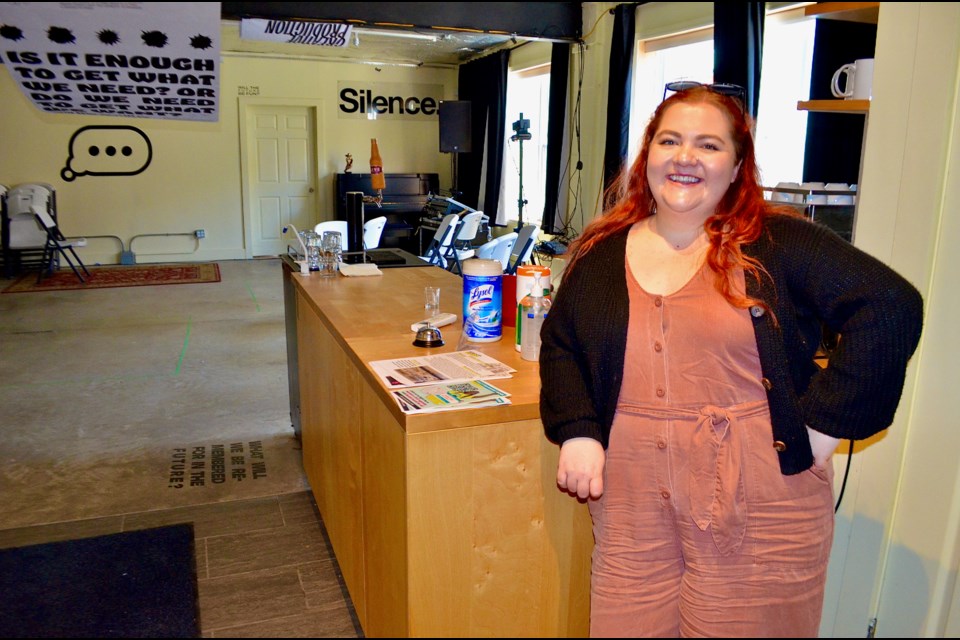The certainty of spring offers hope in the dead of winter but keeping hope alive has been a challenge after more than two years of pandemic conditions.
They have taken their toll on people’s lives and livelihoods and among the hardest hit have been musicians and live music venues.
At the forefront of that struggle is Silence, a live performance and arts venue founded and operated by a collective of Guelph artists and musicians, which has managed to survive the long COVID winter.
“It has been just a whirlwind,” said executive director Scarlett Raczycki. “If we hadn’t been able to access things like the Ontario Small Business Grant and the Canadian Council for the Arts and City of Guelph emergency funding, I don’t think we would have survived the pandemic. We owe those government granting agencies a huge amount of thanks.”
They have also relied on the commitment and ingenuity of Guelph’s diverse artistic community.
“It is something I think we all understand about Guelph that makes it so amazing,” said Raczycki. “We have so many wonderful arts organizations, artists and musicians working tirelessly and who have bolstered us throughout the pandemic.”
Silence, like many other arts and entertainment venues, was forced to improvise and find new, creative ways to keep the music playing during the past two years and that included making performances and exhibits available online.
“We did the Unmuted Series that focused on Black, Indigenous and People of Colour’s voices,” said Raczycki. “Those were pre-recorded performances that we presented with Hillside and made available on the Hillside and Silence websites for 48 hours. Then we did the Winter Carnival concert series with various folk musicians, which was livestreamed.”
Silence operated as a non-profit since its inception in 2012 and became a registered charitable organization in 2020 which makes it unlike most bars, restaurants and other music venues in Guelph.
“There are many great restaurants and bars that are really stepping up to provide spaces for musicians and artists, but we are one of the only places that is a music venue first,” said Raczycki. “We don’t have a full-time liquor license and we don’t make money off of our alcohol sales, generally speaking.”
The pandemic created an unprecedented challenge to all businesses promoting arts and music, but live music venues were struggling long before anyone heard of COVID 19.
“We were seeing the trends in Ontario,” said Raczycki. “Between 2017 and 2019 a venue in Toronto closed every month and in 2020, at least 22 other venues closed.”
That trend was not due to a shortage of musicians willing to play.
“We’ve been seeing a wealth of musicians,” said Silence artistic director Daniel Fischlin. “I could program a full-on festival in a couple days, there is so much demand.”
Guelph musician Lewis Melville has been associated with Silence since it was established and has collaborated with many local musicians over his long career. He has seen how music contributes to the cultural identity and economic security of communities.
“Musicians are basically small businesses so, everything any small business is going through, they are going through, and these are tough times,” said Melville. “Most people I know that are working at music and not making it their sole source of money are just looking for ways to keep doing it and to explore it, learn and grow."
Promoting artistic growth, improvisation and exploration has been their mission statement from the beginning.
“Silence is meant to incubate alternative music,” said Fischlin. “Our thing is to run sustainably and to support the gig economy as much as we can. We want to throw as many gigs and as much money as we can to the people participating in that economy.”
That philosophy is loudly proclaimed with their aptly named Keep Hope Alive Festival, taking place this week at Silence at 45 Essex St. Thursday through Sunday.
“It is a celebration of perseverance through difficult circumstances,” said Raczycki. “The catch phrase is, ‘a celebration of unexpected convergences, new connections, and persistence in the face of unbelievable odds.’”
It will feature a long list of local and international musicians, most of whom have contributed to the Silence sounds over the past 10 years.
Part of the festival will include improvised performances by the featured musicians playing with other featured musicians they’ve never played with before, often on instruments or in band positions they have not performed in before.
“There are completely new experiences being created and I think it speaks a lot to the nature of Silence and the concept of improvisation and experimentation,” said Raczynski.
“It also speaks to how we all had to adopt this skill of improvisation through the last couple years no matter what industry we’re in. You do have to break your walls down a little bit and come in with open expectations because the whole point is that nobody really knows where the night is going when you come to a show at Silence.”
